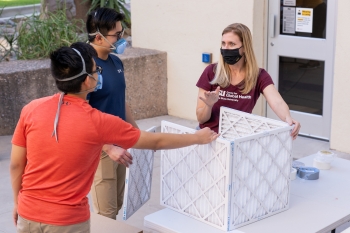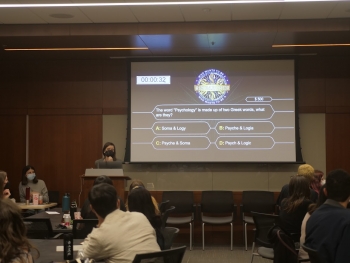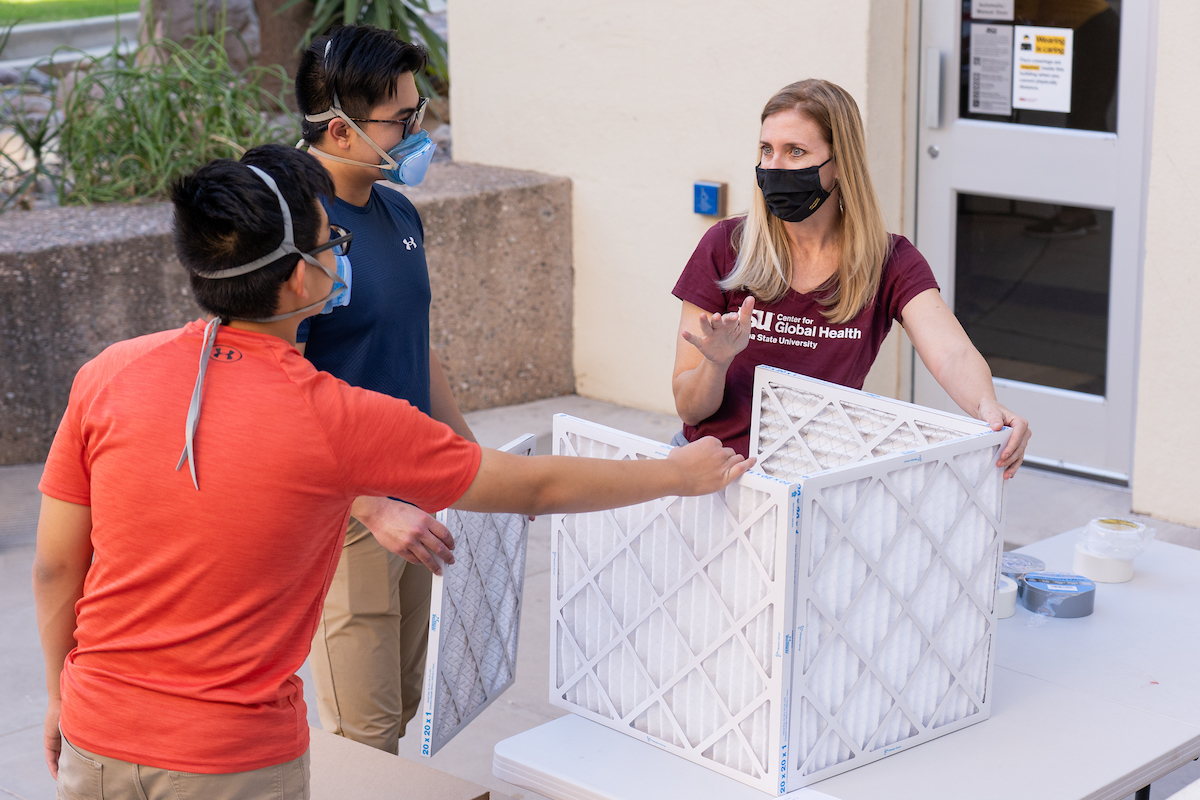As cryptocurrency continues to gain popularity for individuals looking to diversify their investment portfolios, it is also gaining traction as new way for people to give back. Arizona State University’s School of Human Evolution and Social Change recently accepted its first cryptocurrency gift exchanged for U.S. dollars.
“We continually look for innovative ways to enhance the donor experience and meet donors where they are,” ASU Foundation Chief Investment Officer Jeff Mindlin said. “It’s a natural evolution to think that the next generation of donors would give cryptocurrency to support ASU.”  ASU Associate Professor Megan Jehn advises students as they assemble a Corsi-Rosenthal air filtration box during the spring 2022 semester. Download Full Image
ASU Associate Professor Megan Jehn advises students as they assemble a Corsi-Rosenthal air filtration box during the spring 2022 semester. Download Full Image
The university opened cryptocurrency as an opportunity for giving in November 2021. In addition to cryptocurrency, ASU provides many non-cash asset ways to give, including stocks, bonds, fine art, real estate, closely held companies and life insurance. These additional giving options enable the foundation to support the many ways donors want to give.
The first cryptocurrency donation to the university is a $300,000 gift from Balvi, a direct giving fund established by Vitalik Buterin, the co-creator of Ethereum. This donation will support ASU’s Clean Indoor Air Project, a public health initiative focused on increasing awareness about the importance of indoor air quality, improving access to portable indoor air cleaners and evaluating the performance of DIY air cleaners in under-ventilated K–12 classroom environments.
According to their website, Balvi is a scientific investment and direct gifting fund established for the purpose of deploying funds quickly to high-value COVID-19 projects that traditional institutional or commercial funding sources tend to overlook.
ASU’s Clean Indoor Air Project has worked extensively to slow the transmission of COVID-19, including building and testing 275 Corsi-Rosenthal (CR) air filtration boxes that are being used in 21 cities throughout Arizona.
According to Megan Jehn, epidemiologist and associate professor of global health at the School of Human Evolution and Social Change, the funds from this gift will be put to immediate use in support of ASU’s Clean Indoor Air Project, which she leads.
“The Centers for Disease Control (CDC) is expected to ease COVID guidelines in coming days while encouraging schools to do more to clean and refresh indoor air to slow disease transmission and improve health and productivity. Our work aligns well with this national call to action,” Jehn said.
“With this generous gift, we will be purchasing state-of-the art MODULAIR-PM air quality monitors from QuantAQ, Inc for Valley classrooms, partnering with local school districts to evaluate the effectiveness of DIY air cleaners in K–12 classrooms, creating new outreach and dissemination efforts through a Clean Air Ambassadors program for high school students, and launching a citizen science project with our local public libraries through SciStarter.”
SciStarter is an online hub created for the purpose of enabling people to learn about, participate in and contribute to science through research efforts and citizen science opportunities.
“Citizen science enables people of all ages, cultures and skills to engage in real scientific research by collecting or analyzing data that is shared with professional scientists, while provenly increasing public understanding of science,” said Darlene Cavalier, founder of SciStarter and professor of practice at ASU’s School for the Future of Innovation in Society.
The partnership between ASU’s Clean Indoor Air Project and SciStarter will enable 10 libraries in Arizona to add to their suite of citizen science kits to circulate a total of 50 carbon dioxide monitors, along with step-by-step instructions for participants to identify indoor areas with poor ventilation. The information gathered through this program will be shared locally and globally.
“The data will be used by decision-makers, scientists and the public to better understand where there are problems and how to take action,” Cavalier said.
Funding from Balvi’s gift will also support ASU student interns to help in the design of K–12 lesson plans, data tracking, as well as support ongoing efforts to build and deploy DIY air cleaners to communities in need.
“This gift is incredibly valuable to our team because we are in the midst of a fast-moving pandemic and the funds allow us to study innovative ideas to improve indoor air quality to slow the spread of disease,” Jehn said.
Manager, Marketing and Communication, School of Human Evolution and Social Change
480-965-5538 [email protected]
A new grant from the National Science Foundation (NSF) is allowing the Emerging Minds Lab, directed by Arizoan State University psychology Assistant Professor Kelsey Lucca, to expand access to research for undergraduate students and the community. The Emerging Minds Lab explores the genesis of learning and curiosity in children, and, with this new funding, they are able to involve more undergradua…
A new grant from the National Science Foundation (NSF) is allowing the Emerging Minds Lab, directed by Arizoan State University psychology Assistant Professor Kelsey Lucca, to expand access to research for undergraduate students and the community.
The Emerging Minds Lab explores the genesis of learning and curiosity in children, and, with this new funding, they are able to involve more undergraduate students in this work.  This spring, the Emerging Minds Lab at ASU hosted a “Who Wants to Be a Researcher?” trivia night, modeled in the same format as the game show and featuring questions about psychology, ranging from neurons to Sigmund Freud. Download Full Image
This spring, the Emerging Minds Lab at ASU hosted a “Who Wants to Be a Researcher?” trivia night, modeled in the same format as the game show and featuring questions about psychology, ranging from neurons to Sigmund Freud. Download Full Image
The Department of Psychology at ASU has long been proud of the research done by undergraduate research assistants in its labs and has recently been focusing on how to improve access to research for students who may not feel like they can participate. These students may have time, financial or logistical barriers to entry, such as needing transportation or working multiple jobs to support their families.
The $800,000 grant is provided by the NSF CAREER Award “Cultivating Curiosity to Promote Learning and Discovery,” which will provide funding over the next five years to promote the understanding of curiosity and its formation.
“Curiosity is so important for so many different facets of life. Curiosity leads to enhanced engagement and achievement in science, technology, engineering and mathematics (STEM) fields, improved psychological well-being and healthy aging,” Lucca said. “Despite the importance of studying curiosity, we still have very little basic knowledge about curiosity, how it develops and how to promote it. This is because curiosity is notoriously difficult to study, especially in infants and young children”
The grant will fund research on curiosity drawing from cognitive science, developmental science and education to investigate:
- What are the cognitive processes involved in early curiosity?
- How does curiosity unfold across infancy and early childhood?
- What role does the social environment play in shaping curiosity?
- How does curiosity impact STEM learning readiness?
- What factors cause increases in preschool-aged children’s curiosity?
The grant also supports outreach and educational activities.
“A big part of the outreach is thinking about how we can make research more accessible to students who might not have known about it, or know how to get involved. This grant is all about coming up with new ideas and ways to engage with students, pushing the boundaries of what has been done before,” Lucca said.
This spring, the lab hosted a “Who Wants to Be a Researcher?” trivia night, modeled in the same format as the game show and featuring questions about psychology, ranging from neurons to Sigmund Freud. Lab managers Sarah Kiefer (now a developmental psychology PhD student at Brown University) and Vanessa Lazaro (now a developmental psychology PhD student at the University of Chicago) helped with formulating the first event of the grant and creating the creative material to advertise to students.
Paola Hernandez, an honor’s student in the Emerging Minds Lab and recipient of the Janessa Shapiro Undergraduate Research Scholarship, along with Jeri Sasser, ASU psychology graduate student and student representative for ASU’s ENERGIZE program, which helps connect students with research experience during their undergraduate career, also played an integral role in the evening.
“We wanted to make it a special event that was not just coming to listen to a panel of faculty speak about research,” Lucca said. “We ended the night with an ice cream sandwich cart and distributed packets with next steps and tangible ways they could get involved in research if they were interested.”
Faculty were paired up with students based on their research interests, and they competed as a team in order to win the trivia night and to increase their exposure to psychology concepts.
The main purpose of the event was to reduce the barrier to entry for students who were interested in gaining connections with psychology faculty and eventually joining a research lab. The informal setting allowed students to see that they have common ground with psychology faculty who care about their interests and long-term dreams.
“Trivia is a very humbling experience. We had everyone from undergraduate students, graduate students, research staff, junior professors, tenured faculty members, to retired faculty members attend, but the questions really evened the playing field,” Lucca said. “That made it a lot of fun – everyone was laughing and smiling. That to me was a sign of a successful experience. It was fun to see faculty members getting questions wrong and showing the students that it is OK to make mistakes, to laugh and learn.”
It was important to Lucca that the students saw the faculty as approachable and for them to understand that reaching out to a faculty member doesn’t need to be a stressful experience.
“We partnered with ASU’s ENERGIZE program, which has a shared goal of ‘energizing’ students’ interest in psychology, to design and execute the event,” she said.
After the successful event, they plan on building it to be even larger in 2023, and launch a new yearly summer internship program for undergraduate students.
“This was a great trial run, and we really learned a lot about what makes an outreach event valuable to students,” said Lucca.
This spring, the Emerging Minds Lab hosted a “Who Wants to Be a Researcher?” trivia night, modeled in the same format as the game show and featuring questions about psychology, ranging from neurons to Sigmund Freud.
Assistant Professor Kelsey Lucca introduces the event.
Psychology Lecturer Erin Lanphier shares about the ENERGIZE program to attendees.
Marketing and Communications Manager, Department of Psychology
480-727-5054 [email protected]
Contact us


